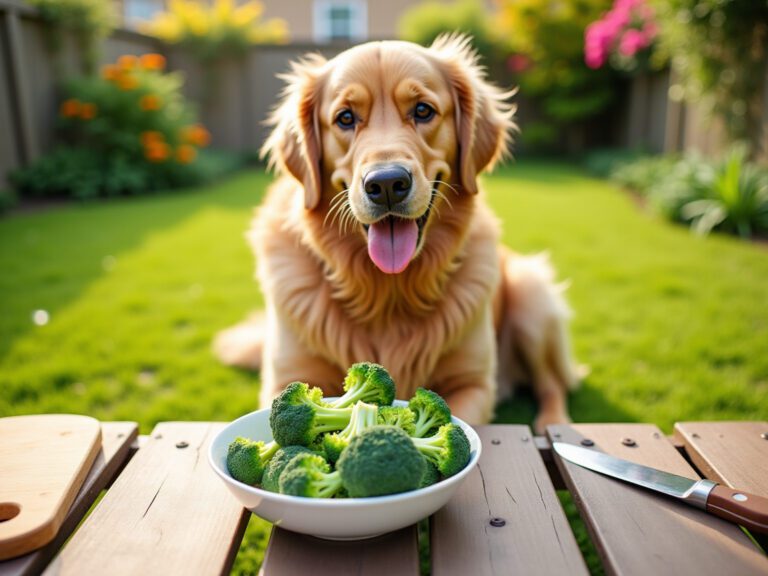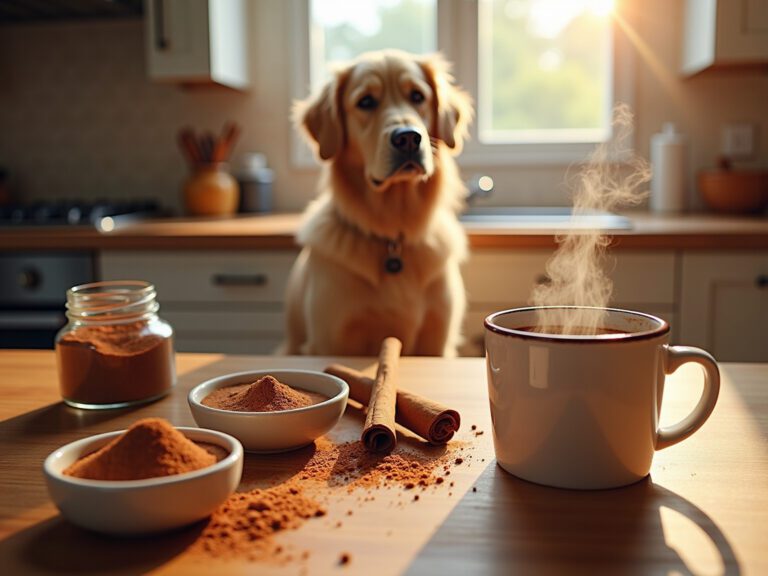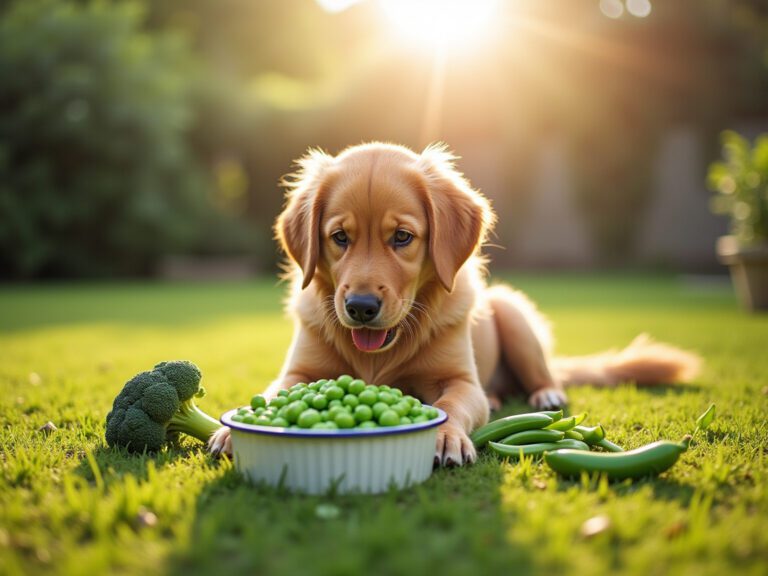Is Cauliflower Good for Dogs? Explore Its Benefits and Risks
Overview
Cauliflower can be a wonderful addition to your furry family members’ diet when offered in moderation. It’s low in calories and packed with essential nutrients that support immune function, digestion, and overall health.
At Adventure Den, we understand that introducing new foods can be a concern for pet owners. That’s why we emphasize the importance of gradually adding cauliflower to your dog’s meals to avoid any gastrointestinal upset.
Remember, treats should not exceed 10% of your dog’s daily caloric intake, ensuring a balanced diet while maximizing health benefits. Your pet’s well-being is our priority, and we are here to support you every step of the way.
Introduction
Introducing vegetables into your dog’s diet can truly enhance their health, and cauliflower emerges as a particularly nutritious choice. This low-calorie vegetable is packed with essential vitamins and minerals, supporting immune function and promoting healthy digestion. Additionally, it may even offer potential anti-cancer properties that can benefit your furry family members.
However, as a caring pet owner, it’s important to navigate the delicate balance of safely introducing cauliflower to avoid any gastrointestinal upset. By understanding the health benefits, appropriate serving methods, and necessary precautions, you can confidently add this versatile vegetable to your dog’s meals. This way, you ensure they enjoy all the advantages of cauliflower while prioritizing their well-being.
Assess Nutritional Value of Cauliflower for Dogs
Cauliflower is a low-calorie vegetable that offers a wealth of essential nutrients, so the question is: is cauliflower good for dogs as a wonderful choice for your furry family members? This vegetable, which raises the question of whether cauliflower is good for dogs, is packed with vitamins C, K, and B6, along with folate, potassium, calcium, magnesium, and manganese. It plays a vital role in supporting your dog’s immune function, promoting healthy bones, and aiding in digestion.
The high fiber content can also help regulate your dog’s digestive system, making it a delightful snack for maintaining gastrointestinal health. However, it’s important to consider if cauliflower is good for dogs, as moderation is key to avoid any digestive upset. Following the 90/10 principle for your dog’s nutrition is a great guideline to adhere to, meaning that snacks—including this wholesome vegetable—should not exceed 10% of your dog’s daily caloric intake.
Start with small quantities and gradually increase them to help prevent any digestive issues, allowing your pets to safely enjoy this nutritious vegetable. By following these simple guidelines, you can find out if cauliflower is good for dogs and incorporate it into your dog’s meals, reaping its health benefits while ensuring your beloved companions remain joyful and fit. Your commitment to their well-being reflects the nurturing environment they deserve.
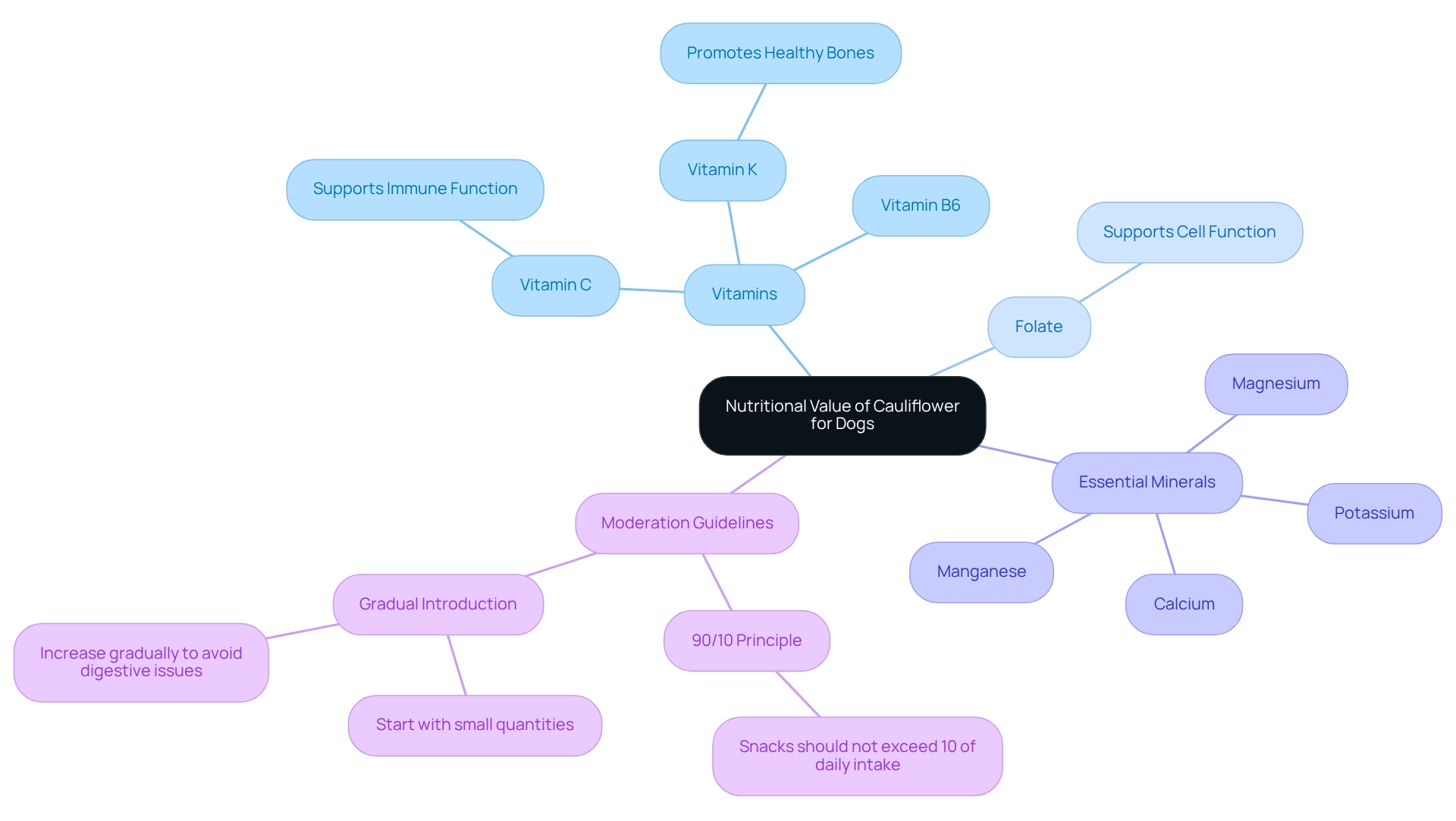
Identify Health Benefits of Cauliflower for Dogs
When offered in moderation, many pet owners wonder, is cauliflower good for dogs, as it can be a wonderful addition to your furry family members’ meals. This nutritious vegetable is packed with antioxidants, which are vital for combating oxidative stress and may help reduce the risk of chronic diseases. With its high fiber content that supports healthy digestion and prevents constipation, it raises the question of whether is cauliflower good for dogs as a valuable part of their diet. Additionally, the vitamins found in cauliflower can enhance immune health and improve the condition of your dog’s skin and coat, leading to the question of whether is cauliflower good for dogs.
Research suggests that glucosinolates, compounds found in cauliflower, may have anti-cancer properties, indicating that this vegetable could be a beneficial component of your dog’s diet. To safely incorporate cauliflower, consider:
- Sprinkling small pieces on their regular food
- Offering them as snacks
- Blending them into [[[a delightful doggy smoothie
A practical guideline is to serve a ½-inch piece as a snack. However, it’s important to prepare cauliflower properly—steaming is recommended to retain its nutrients, and the stalk should be avoided to prevent choking hazards. As Lynn Guthrie wisely notes, treats should comprise no more than 10% of your dog’s daily calories, with the remainder coming from their regular, balanced meals. Overall, including cauliflower in your dog’s meal plan raises the question of whether is cauliflower good for dogs, as it can contribute to a nurturing and nutritious feeding regimen.
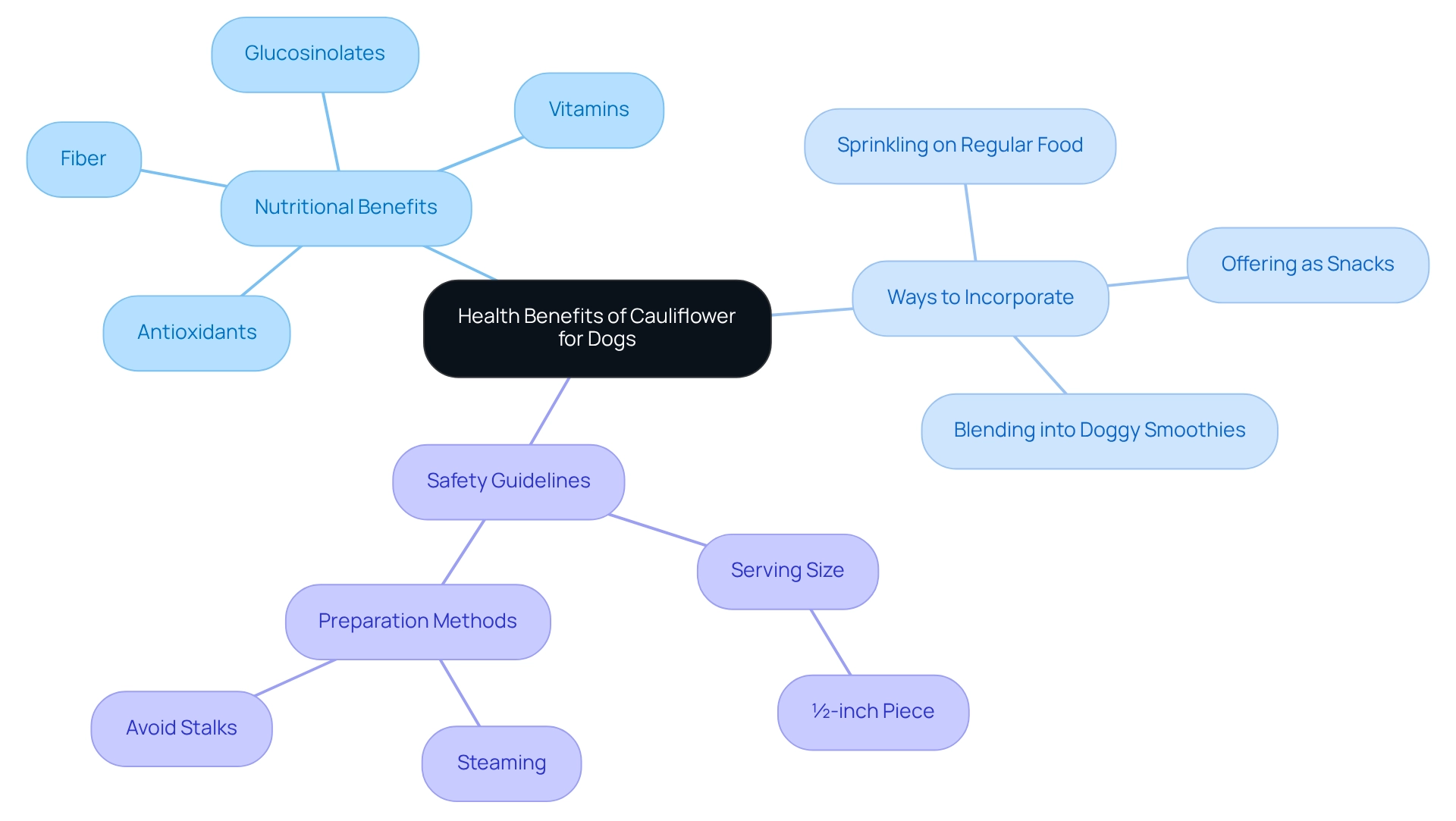
Evaluate Risks and Precautions of Feeding Cauliflower to Dogs
While this vegetable can be a healthy addition to your furry family member’s diet, it’s important to determine if cauliflower is good for dogs and be aware of potential risks. Overfeeding may lead to gastrointestinal issues, including gas, bloating, or diarrhea, especially if introduced too quickly. Some dogs might also show sensitivities or allergies to cruciferous vegetables, making it important to consider if cauliflower is good for dogs, as this can lead to digestive upset or skin reactions. To help your pet thrive, consider introducing this vegetable gradually while also determining if cauliflower is good for dogs by watching for any adverse effects.
Additionally, it’s wise to avoid adding salt, butter, or other substances that could be harmful to your canine companion. Consulting with a veterinarian before making significant dietary changes is crucial; they can provide tailored advice based on your pet’s individual health needs. Research suggests that offering up to three ounces of this vegetable daily is suitable for a 50-pound dog, but remember, moderation is key.
For pet owners who want to provide fresh produce, think about cultivating your own vegetables. This ensures a chemical-free food source that supports your pet’s health and wellness. As Lynn Guthrie wisely notes, “It’s always a good idea to give your dog a variety of healthy snacks.” This highlights the importance of a balanced diet for your beloved canine, fostering a nurturing environment that promotes their overall well-being.
Guide on Preparing and Serving Cauliflower to Dogs
To safely provide this vegetable to your furry family members, begin by thoroughly cleaning and chopping it into small, manageable pieces to minimize choking risks. Cooking methods such as steaming or boiling can enhance digestibility and help reduce the risk of gas, ensuring your pet feels comfortable. Remember, it’s crucial to avoid adding oils, butter, or seasonings, as these can be harmful to dogs.
Introduce this vegetable in small amounts to evaluate your dog’s tolerance, ensuring that snacks like this do not surpass 10% of their daily caloric intake. Dr. Ochoa advises that when offering this as a treat, give only a few small pieces 2-3 times a week at most. If your dog experiences excessive gas or stomach discomfort after eating this vegetable, consider reducing or removing it from their meals. Always consult with a veterinarian for tailored dietary recommendations before introducing new foods.
Furthermore, including vegetables such as broccoli can offer nutritional advantages, aiding in a balanced diet for your pet. A case study on daily cauliflower consumption raises the question of whether is cauliflower good for dogs, suggesting it can be added to a dog’s meals or given as a snack, provided it is fed in moderation. By nurturing your pet’s diet with care, you can ensure they thrive and enjoy every moment with you.
Conclusion
Incorporating cauliflower into your furry family member’s diet can significantly enhance their health by providing essential nutrients and potential benefits. This low-calorie vegetable is rich in vitamins and minerals, including vitamins C, K, and B6, which support immune function and promote healthy bones. Additionally, the high fiber content in cauliflower aids digestion, making it an excellent choice for maintaining gastrointestinal health.
However, moderation is crucial when introducing cauliflower to your dog’s meals. Following the 90/10 rule ensures that treats, including vegetables like cauliflower, do not exceed 10% of your dog’s daily caloric intake. This approach helps prevent digestive issues while allowing your pet to enjoy the nutritional benefits of this versatile vegetable. Proper preparation methods, such as steaming and cutting into small, manageable pieces, further reduce risks and enhance digestibility.
Awareness of potential risks is also essential. Overfeeding or introducing cauliflower too rapidly can lead to gastrointestinal upset, and some dogs may have sensitivities to cruciferous vegetables. Gradual introduction and close monitoring of any adverse reactions can help mitigate these risks. Consulting with a veterinarian before making dietary changes ensures that the individual health needs of each dog are taken into account.
Ultimately, adding cauliflower to your dog’s diet can be a rewarding practice that promotes overall health and well-being. By understanding the nutritional value, health benefits, and necessary precautions, you can confidently include this nutritious vegetable in your furry friend’s meals, contributing to a balanced and happy life.
Frequently Asked Questions
Is cauliflower good for dogs?
Yes, cauliflower is good for dogs as it is low in calories and packed with essential nutrients, including vitamins C, K, and B6, as well as folate, potassium, calcium, magnesium, and manganese.
What health benefits does cauliflower provide for dogs?
Cauliflower supports a dog’s immune function, promotes healthy bones, aids in digestion, and its high fiber content can help regulate the digestive system.
How should cauliflower be incorporated into a dog’s diet?
Cauliflower should be given in moderation. Following the 90/10 principle is recommended, meaning that snacks, including cauliflower, should not exceed 10% of your dog’s daily caloric intake.
How can I introduce cauliflower to my dog’s diet?
Start with small quantities of cauliflower and gradually increase them to help prevent any digestive issues.
What precautions should I take when feeding my dog cauliflower?
Moderation is key to avoid any digestive upset, so it’s important to monitor your dog’s reaction and adjust the amount accordingly.


